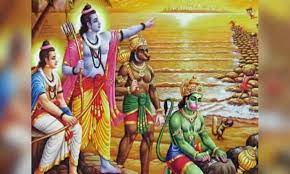
During the journey the three arrived at the hermitage of Vamadeva, and Visvamitra told his story.
Finally, Visvamitra, Rama, and Laksmana arrived in the stupendous place where the sage lived and performed his austerities and his sacrifices. There were many ascetics there engaged in the most disparate services, and all of them emanated a light of purity and serenity. Most of them dressed in plain orange cotton, had their hair clustered at the top of their heads. The scene was idyllic and Rama felt happy and relieved. How much spirituality emanated from that place! When a man, feeling tired of the illusions of the materialistic life wished to turn within himself to find the true meaning of his existence, he used to go to one of these ashrama, or places where the spiritual life was practiced. Gradually the burning of desires, anger, and envy subsided and a new consciousness arose from the heart. What allowed this to happen in the being was God’s conscience. There was a strong spiritual atmosphere in Visvamitra’s ashrama.
Visvamitra did not want to delay any longer and began the preparations for the yajna. In a short time, everything was ready and the ceremony began again. Rama and Laksmana warned themselves carefully, constantly looking around.
They neither ate nor slept for six days and six nights.
On the sixth day, there was a dull rumbling from heaven. And while the ascetics continued undaunted to recite the Vedic mantras and throw ghee into the sacred fire, Rama and his brother understood that the demons were coming. They exchanged a knowing look.
Filthy objects began to fall from the sky: pieces of flesh, blood, entrails, urine, excrements, and all kinds of filth.
There was a violent, chilling laugh and the demonic rain increased. Rama reacted by starting to shoot arrows upwards with such speed that it created a giant dome made of arrows through which nothing could filter. Maricha and Subahu were amazed at what was happening and began to drop huge boulders. But Rama rejected those too. At that point the Raksasas realized they were dealing with an opponent worthy of serious consideration and stopped playing. So, they attacked the two young princes.
After a violent fight Rama killed Subahu and threw Maricha many miles away, using the weapon called vayavya-astra, which created a rushing wind. The last sound that was heard was Maricha’s cry of anger. The Rakshasas were defeated and from that day on, the life of the Rishis in the forest was peaceful again.
The saints personify the principles of religion and when these are in danger, Vishnu embodies and protects them. This is his solemn promise.
Rama and Laksmana were happy with their task’s success, and when the sacrifice was finished, they presented themselves before the sage. Rama said, on behalf of both of them:
“Those wicked beings have been defeated and will no longer disturb you. Tell us, what else can we do for you?”
Visvamitra smiled and bowed his head forward expressing his happiness for the success achieved and approval for the humble attitude of the princes. He told them:
“Janaka, Mithila’s king, is about to perform a great sacrifice. He has a bow that was once Shiva’s personal weapon. Then the God gave it to King Devarata, who later gave it to Janaka. But it wasn’t a normal bow. Nobody can hold it; what about if you try it? My valiant princes, if you want we can go to Mithila to admire Shiva’s bow.”
This is a section of the book “The Ramayana”, in English.
To buy the complete book, click above
Post view 752 times



Leave a Reply